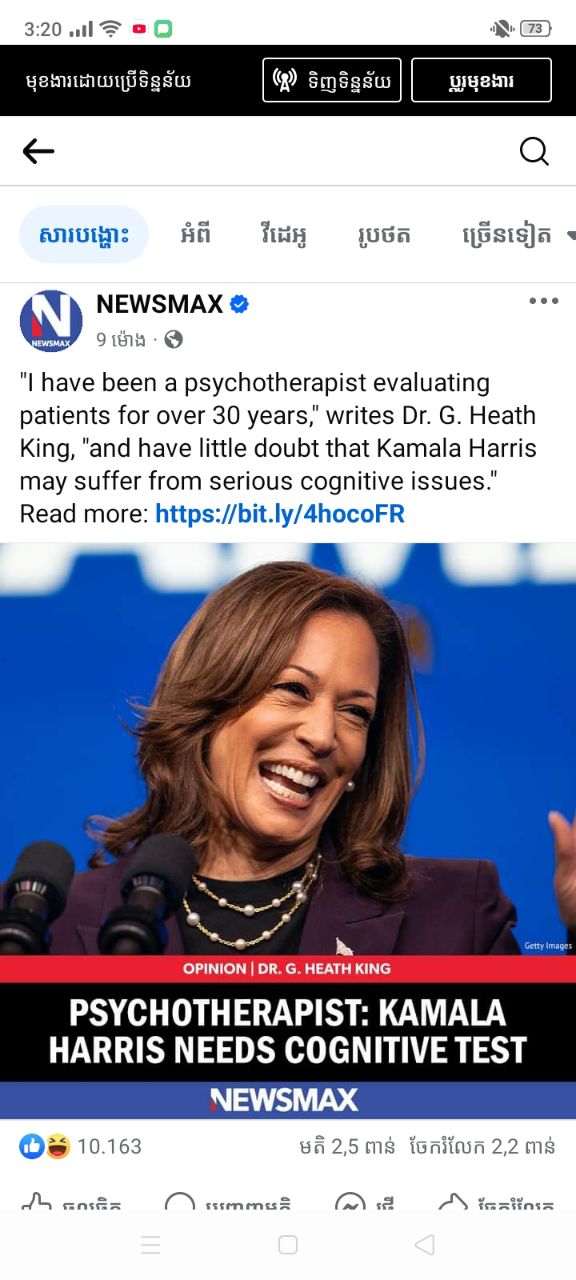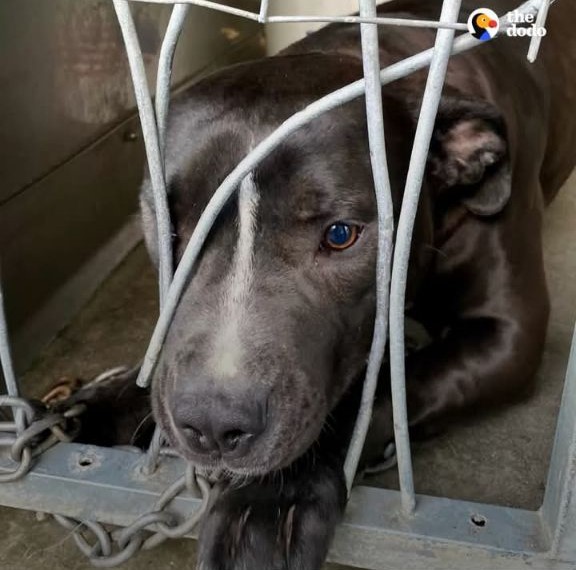
(Getty)
(Editor’s Note: The following opinion column does not constitute an endorsement of any political party, or candidate, on the part of Newsmax.)
OPINION
I have been a psychotherapist evaluating patients for over 30 years, and have little doubt that Kamala Harris may suffer from serious cognitive issues.
Before assuming the most powerful job in the world, Harris has exhibited serious cognitive deficiencies that should set off alarm bells for any health professional.
I am not diagnosing the vice president.
But I am saying there are serious issues the American people have a right to know about a major public official.
Former President Donald Trump has unceremoniously called into question Harris’ level of intelligence as she seeks to lead the nation.
It’s a fair question, but perhaps less threatening than serious mental deficiencies by which Harris may be impaired.
Like many other observers, Trump has also noted Harris’ chronic, inappropriate episodes of laughter.
The fact that these two conditions — intelligence issues and erratic laughter — are so pronounced, protracted, and interlaced suggests they are manifestations of a single clinical condition.
Harris’ unusual laughing fits do not necessarily reflect a happy mood.
Harris, in fact, may have a condition known as pseudobulbar affect (PBA), a neuropsychological disorder that arises from trauma, most often from a lesion to the head resulting in damage of neuro fibers transmitting motor instructions from the cerebral cortex to the lower brain stem.
This neurological disorder and accompanying compromised intellectual grasp may have been induced by a severe blow to the head with a rock incurred by Harris at the age of 5 during a quarrel at school.
Harris’ childhood incident did happen, and it was described by her childhood friend and classmate Stacey Johnson-Batiste in her memoir.
The blow required stitches at a hospital and left a scar over Harris’ left eye.
Significantly, the area over the left eye is the location of the frontal lobe of the cerebral cortex, which governs laughter, decision-making, problem-solving, attention, and emotional and behavior control, including intelligence.
A 2018 study published by the National Library of Medicine confirms this connection, concluding “PBA was associated with a lower IQ.”
This lack of cognitive grasp may explain why Harris has evaded interviews to a degree unprecedented by any presidential candidate.
When she has spoken at campaign events, her presentations were written by speechwriters like Adam Frankel, a Princeton alumnus and Fulbright Scholar who eclipses Harris intellectually.
By contrast, Harris performed unremarkably at Hastings Law School, ranked 82nd in the nation.
She is in fact the only presidential candidate in modern history with a law degree who did not graduate from a top-ranked law school.
As a law student at Hastings, she became president of the radical-left Black Law Students Association that later, during Harris’ term in the White House, prevented prominent Jewish libertarian speaker Ilya Shapiro, executive director of Georgetown University’s Constitution Center, from delivering his scheduled speech.
Shapiro previously had questioned in a tweet why President Joe Biden had vowed to appoint a then-unnamed Black woman to the U.S. Supreme Court on the basis of only her skin color.
A person with a compromised cognitive capacity will naturally lack confidence and avoid exposure in verbal exchanges.
This can take the form of psychological censorship: labeling those individuals and social media companies who challenge her as purveyors of “hate,” as she did in 2019, when she threatened consequences if they do not “police” their platforms.
In another encroachment on the First Amendment, she repeated this again in signature rote fashion almost verbatim just the other week at a speech at the NAACP, which has now pressured the University of South Carolina to cancel a scheduled critique of Harris.
A crisis of confidence issuing from a deficit in cognitive grasp can also take the form of avoiding all interviews, as Harris did for over 40 days since she was catapulted to the position of Democrat presidential candidate.
This was noted by the eminent body language expert Susan Constantine when Harris, under pressure from all quarters, finally granted an interview with media ally CNN, propped by her vice presidential candidate Tim Walz, “to whom she was looking for acknowledgment.”
Particularly revealing, as Constantine pointed out, was Harris’ head bobbling when struggling to come up with answers, as if she were asking herself, ‘What part of the file in my subconscious am I going to pull out? Which ones are my answers?'”
Constantine continued, “She couldn’t come up with a crystal clear answer, and that’s why she tends to bobble,” showing “she is not confident in what she’s saying.”
Constantine likewise made incisive observations on Harris’ body language during the presidential debate, pointing to the inauthenticity of Harris’ smiles, which she used as a “fallback plan” when she could not refute the points made by Trump.
To buy time, the smiles were abnormally long, with Constantine calling her simulated smirk a “perma-smile.”
And as with the CNN interview Harris, Constantine pointed out, when Harris could not answer a question, she again looked downward with her head bobbling — this representing a “cluster of deception.”
Another symptom of this cluster is the discernible progressive involuntary tightening of the throat as Harris compounded the deceptions, a manifestation of PBA known as laryngeal dystonia.
In her deception decoding Constantine brings the same expertise that she brought to her work with the Department of Defense’s Office of the Inspector General, the Federal Court Judicial Law Judges, and as a legal consultant, including on the Jeffrey Epstein case.
As far back as Harris’ time in 2010 as California’s attorney general, her staff reported her avoidance of spontaneous interviews and the highly unusual extent of her dependence on notes, to a degree that she would insist on traveling with a battery-powered printer to reprint note cards.
It is the absence of notes, the dictates of a teleprompter, props of one variant or the other, so-called “word salads” have been observed as characteristic of Harris’ discourse.
With people who ramble in word salads, speech, as behavioral specialist Gregg Levoy wrote in Psychology Today, can become “a barrier rather than a connector.”
In explicit concrete terms this deception is found incontrovertibly in the written word, most notably in Harris’ book “Smart on Crime,” in which the famed Austrian “plagiarism hunter” Stefan Weber identified 27 plagiarism fragments.
Weber, the author of “The Google-Copy-Paste-Syndrome: How Web-Plagiarism Endangers Education and Knowledge,” has found resonance in the investigations of The New York Times plagiarist consultant Jonathan Bailey.
Upon reviewing the entire dossier provided by Weber, Bailey conceded just this week that Harris’ plagiarism was more egregious than he had initially thought, which included lifting paragraphs from Wikipedia verbatim.
It was already during the period of position as California’s attorney general that another neurological symptom associated with PBA — anger outbursts — was reported by her staff.
Like chronic, inappropriate laughter, unprovoked involuntary fits of anger in PBA are caused by disrupted signals in the brain.
In Harris’ case, bouts not only of unseemly laughter but also of fits of anger appear to have intensified in the greater anxiety-inducing atmosphere of higher office and public exposure, as evidenced by an even higher turnover of staff while she has been vice president.
The eruption of PBA-induced anger is often unpredictable and, like laughter, inappropriate to the social context.
This is conveyed by a former aide who reported, “You never knew when she was going to snap at you.”
Understandably, this created a toxic work environment and “sense of paranoia.”
According to a tally by the nonpartisan watchdog Open The Books, only 4 of 71 of the staffers she chose in her first year in office remain, the others having been discharged or having quit.
This is equivalent to a 92% staff turnover, unparalleled in the history of the executive office.
The report of this and other aides who related berating and expletive-laden tirades is confirmed by Barbara O’Connor, professor of communications at California State University at Sacramento, who said she spoke to several members of Harris’ staff who came to her in tears.
Hence, Harris suffers from a crisis in intellectual grasp that leads to the weaponization of laughter to elude spontaneous dialogue. Anger becomes a form of censorship.
As there is no cure for PBA, and medication like Nuedexta can be taken only periodically owing to severe side effects, the condition is known to worsen with time, as indicated by behavioral markers.
A study published in the journal Neurology in 2016 found that by normalizing neurotransmitters in the brain, speech is improved, which may be significant in explaining the more fluid speech patterns in the presidential debate, though without an enhancement in logical response or content beyond Hallmark card phrases.
As PBA is often undiagnosed or misdiagnosed, those afflicted may self-medicate, especially in situations that present for them high anxiety.
For Harris another pivotal, revealing moment came in the 2019 Democrat presidential primary debate when Tulsi Gabbard zeroed in on the curious contradiction that while Harris was California’s attorney general, she “put 1,500 people in jail and then laughed about it when she was asked if she ever smoked marijuana.”
The Canadian evolutionary scientist Gad Saad observed signs of intoxication in Harris during a speech in Madison, Georgia.
Other observers have noted the same.
On Sept. 20, again in Georgia, one of her most obviously intoxicated appearances took place.
While cannabinoids can alleviate some conditions such as chronic pain and insomnia, they are also known to cause short-term memory loss and cognitive impairment, already induced by PBA.
The interlacing mental matrix takes on at this point sharp contours: A crisis in intellectual grasp leads to the weaponization of laughter to elude a dialogue of ideas while anger becomes a form of censorship.
As in the case of Harris herself, it is necessary to penetrate to the roots of this malaise.
Harris has asserted that social media should be subject to “oversight and regulation” and that the free flow of open dialogue, protected by the First Amendment, must cease.
Accordingly, she called for the removal of Trump’s account on Twitter, now X, because of ideas that she deems to have a negative effect on society.
In an inflammatory speech to the NAACP on censorship this year, Harris again threatened governmental repercussions on social platforms that fail to “police” its members according to state stipulations.
The ever prescient Elon Musk posted on X this year: “Free speech is the bedrock of democracy and the Democratic Party (Kamala is just a puppet) wants to destroy it.”
In response, former Labor Secretary Robert Reich, who served in the Obama administration, supports Harris in this censorship of free speech and called for regulators to threaten the arrest of Musk.
In an incursion of the free market, he has also called for the boycott of Tesla and X.
Intelligence and innovative solutions thrive in free speech, while those lacking cognitive ability will naturally gravitate toward decisions made for them from above as by state oversight, what George Orwell foresaw as the advent of a “Ministry of Truth.”
The intellectually compromised Harris received reinforcement in this with the legacy of her Jamaican Marxist father having dedicated his book on economic state control to her.
The dedication came after he compounded her original trauma by abandoning the family in a protracted, acrimonious divorce.
She was 7, two years after her severe blow on the cerebral cortex.
Clinically, I cannot say Harris suffers from PBA, but the warning signs are apparent.
The press and public should demand the vice president undergo serious cognitive testing.
This is no laughing matter.
G. Heath King, Ph.D., is a psychoanalyst and formerly taught at Yale University.



 ️ Eliza arrived at City of San Bernardino Animal Services a few weeks ago, and, so far, she’s not loving it. She’d rather be somewhere with her
️ Eliza arrived at City of San Bernardino Animal Services a few weeks ago, and, so far, she’s not loving it. She’d rather be somewhere with her